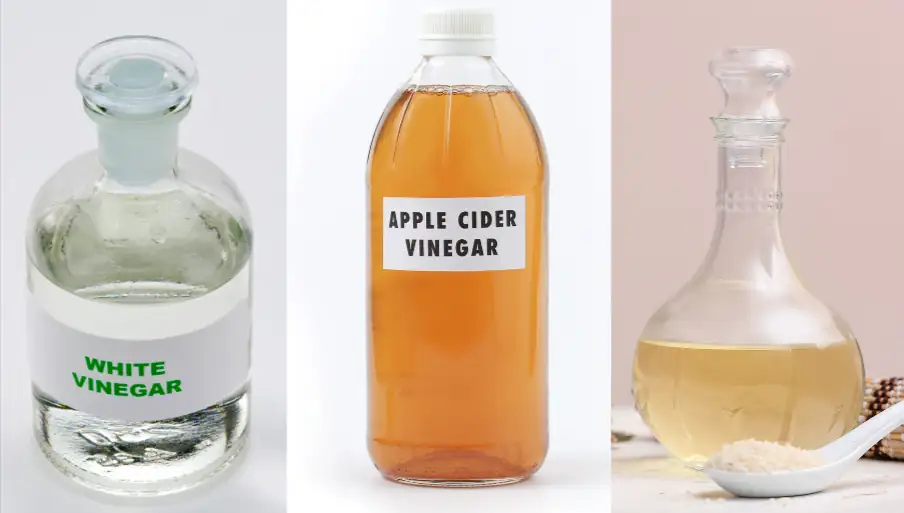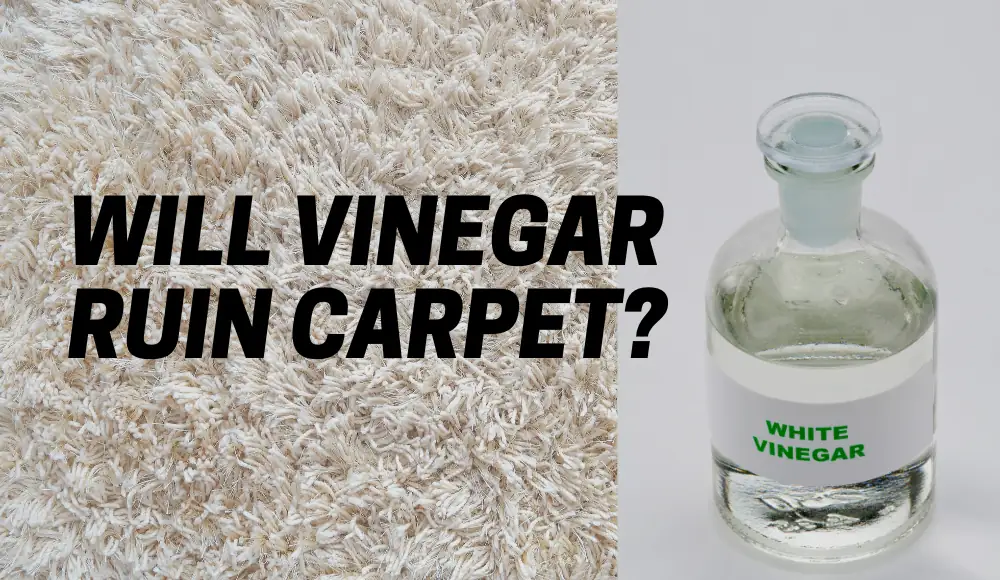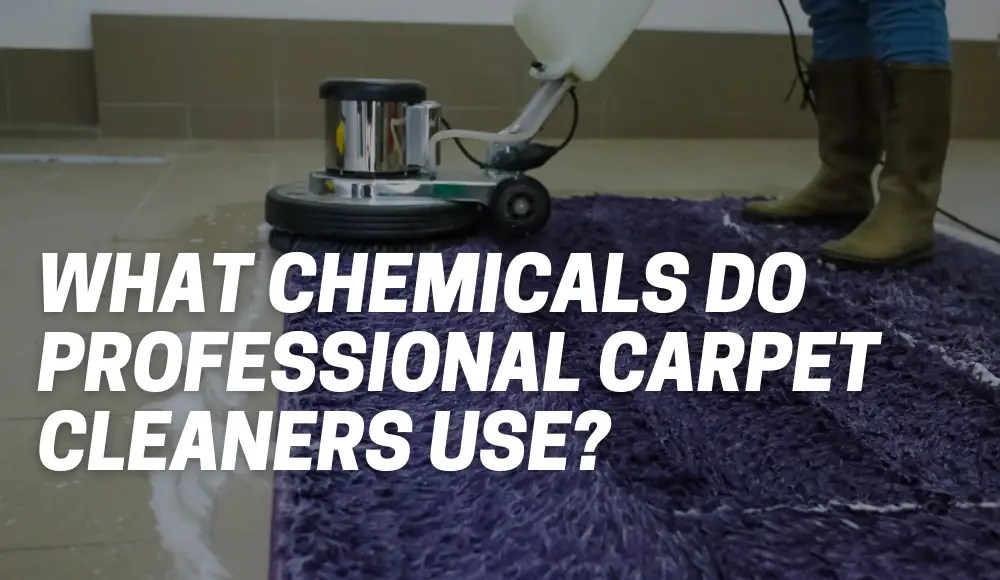Vinegar has long been hailed as a versatile household product, known for its cleaning properties and natural benefits. However, when it comes to using vinegar on carpet, there are several questions that arise. Can any type of vinegar be used for carpet cleaning? Will white vinegar destroy a carpet? What should you do if you accidentally spill vinegar on your carpet?
In this article, we will delve into these queries and provide you with a comprehensive understanding of vinegar’s impact on carpets.
What is Vinegar?
First things first.
Vinegar is a versatile liquid that’s made from the fermentation of ethanol. It has been used for centuries in cooking, cleaning, and as a natural remedy.
Vinegar contains acetic acid, which gives it its characteristic sour taste and pungent smell. The acidity of vinegar varies depending on the type and can range from mild to highly acidic.
Definition and Explanation of Vinegar
Vinegar is a liquid that’s made by fermenting ethanol with bacteria. This process converts the alcohol into acetic acid, which gives vinegar its sour taste and strong odor. Most vinegars contain between 5% to 20% acetic acid, depending on the type.
There are many types of vinegar available today, including white vinegar, apple cider vinegar, balsamic vinegar, rice wine vinegar, red wine vinegar, and more. Each type has unique characteristics based on its production process and ingredients.
Different Types of Vinegar
White vinegar is made by fermenting grain alcohol with bacteria and then diluting it to around 5% acidity with water. It’s a versatile cleaning agent that can be used for everything from removing stains to disinfecting surfaces.
- Apple cider vinegar is made by fermenting apple cider with bacteria until it turns into acetic acid. This type of vinegar has many health benefits when consumed in moderation but can also be used as a natural cleaning agent.
- Balsamic vinegar comes from Italy and is made by reducing grape juice over a long period until it becomes thick like syrup. This sweet-tasting vinegar adds depth of flavor to salads or marinades.
- Rice wine vinegar is popular in Asian cuisine and is made by fermenting rice with bacteria until it turns into acetic acid. It has a mild taste that works well in dishes such as sushi rice or stir-fries.
- Red wine vinegar is made by fermenting red wine with bacteria until it becomes acidic. It’s often used in salad dressings and marinades to add a tangy flavor.
Can I Use Any Type of Vinegar for Carpet Cleaning?
When it comes to carpet cleaning, not all types of vinegar are created equal.
While there are various types of vinegar available, such as mentioned earlier – apple cider vinegar, rice vinegar, and wine vinegar – the most commonly recommended vinegar for carpet cleaning purposes is white vinegar.
White vinegar is known for its mild acidity, making it a suitable choice for many cleaning tasks, including carpets.

Will White Vinegar Destroy a Carpet?
No need to panic! When used appropriately, white vinegar should not ruin your carpet.
In fact, it can be quite effective in tackling common carpet stains and odors. However, it is crucial to use vinegar in moderation and follow the proper cleaning procedures to prevent any potential damage.
What to Do If You Spill Vinegar on Carpet
Accidents happen, and if you find yourself with vinegar spilled on your carpet, quick action is essential.
Here’s a step-by-step guide to minimizing any potential damage:
- Blot the Affected Area: Take a clean cloth or paper towel and gently blot the vinegar-soaked spot. Avoid rubbing the stain, as this can spread it further into the carpet fibers.
- Prepare a Vinegar-Water Solution: Dilute one part white vinegar with three parts water. This diluted solution will be milder and safer for your carpet.
- Apply the Solution: Using a spray bottle, apply the vinegar-water solution to the stained area. Be careful not to oversaturate the carpet.
- Blot Again: After applying the solution, gently blot the area with a clean cloth to absorb the moisture and lift the stain. Repeat this process until the stain is no longer visible.
- Rinse with Water: Once the stain has been lifted, rinse the affected area with clean water to remove any remaining vinegar residue. Again, blot the area to remove excess moisture.
- Allow to Dry: Finally, allow the carpet to air dry completely. Avoid walking on the damp carpet until it is fully dry to prevent any potential damage.
Remember, the key is to act swiftly and avoid letting the vinegar sit on the carpet for an extended period.
Can You Spray White Vinegar on Carpet?
Yes, you can use a spray bottle to apply a vinegar-water solution to your carpet.
Spraying the solution evenly allows for better coverage and ensures that the vinegar reaches the affected areas.
However, as mentioned earlier, it is crucial not to oversaturate the carpet. Use a fine mist setting on your spray bottle and apply the solution sparingly.
Do I Need to Rinse Vinegar Out of Carpet?
Rinsing the vinegar out of the carpet is an essential step to prevent any potential damage.
While vinegar can be effective in breaking down stains and eliminating odors, leaving it on the carpet for an extended period may lead to discoloration or other issues. Therefore, after treating the stain with a vinegar-water solution, it is crucial to rinse the carpet with clean water to remove any remaining vinegar residue.
This will help maintain the carpet’s appearance and integrity.
Will Vinegar Leave a Smell in Carpet?
When used in moderation and properly rinsed, vinegar should not leave a lasting smell in your carpet.
Vinegar’s strong scent may be noticeable immediately after cleaning, but it typically dissipates as the carpet dries.
If you find that the smell persists, there are a few steps you can take:
- Open windows or use fans to improve ventilation and expedite the drying process.
- Sprinkle baking soda on the carpet and let it sit for some time before vacuuming. Baking soda can help absorb odors and leave your carpet smelling fresh.
By following these additional steps, you can ensure that any lingering vinegar smell is effectively neutralized.
Will Vinegar Bleach Carpet?
One of the concerns people have when using vinegar on carpet is the potential for bleaching or discoloration.
Fortunately, white vinegar is generally safe to use and does not contain bleach or other harsh chemicals that may cause discoloration. However, it is always recommended to test the vinegar solution on a small, inconspicuous area of the carpet before applying it to a larger, more visible area.
This test will help ensure that the vinegar does not have any adverse effects on the carpet’s color.
Can I Put Vinegar in My Carpet Cleaner for Pet Urine?
If you’re dealing with pet urine stains or odors on your carpet, vinegar can be a helpful addition to your carpet cleaning routine. However, it is essential to follow the manufacturer’s instructions for your specific carpet cleaner and check if vinegar is compatible with it.
Some carpet cleaners may have specific recommendations or guidelines regarding the use of vinegar or other cleaning agents.
Always prioritize the instructions provided by the manufacturer to prevent any potential damage to your carpet cleaner or the carpet itself.
Alternatives to Using Vinegar on Carpet
Finding Other Natural Cleaning Solutions
If you’re not a fan of using vinegar for cleaning carpets, don’t worry! There are plenty of other natural solutions that are just as effective.
One popular option is baking soda. Baking soda works as a gentle abrasive that can lift stains and odors from your carpet without damaging the fibers.
Simply sprinkle some baking soda on the affected area, let it sit for a few hours, then vacuum it up. Another great option is hydrogen peroxide.
This powerful cleaner can remove even tough stains like red wine or blood. Mix equal parts hydrogen peroxide and water, apply it to the stain, then blot with a clean cloth until the stain is gone.
Call in the Professionals
If you’re dealing with a particularly stubborn stain or just want to give your carpets a deep clean, you may want to consider hiring a professional cleaning service.
Professional cleaners have access to specialized equipment and solutions that can get your carpets looking like new again.
They can also help remove allergens and bacteria from your carpets, improving indoor air quality and making your home safer and healthier for you and your family.
Just be sure to do your research before hiring a company – look for reviews online and ask friends or neighbors for recommendations – so you end up with a reputable cleaner who will do an excellent job without breaking the bank!
Conclusion
Vinegar can be a valuable ally when it comes to carpet cleaning, particularly when used correctly.
By following the guidelines outlined in this article, you can effectively address stains, odors, and other carpet-related issues with the help of vinegar.
Remember to use white vinegar, act quickly in case of spills, and rinse thoroughly to ensure the best possible results. With proper care, vinegar can be a reliable and people-first solution for maintaining the cleanliness and longevity of your carpets.



